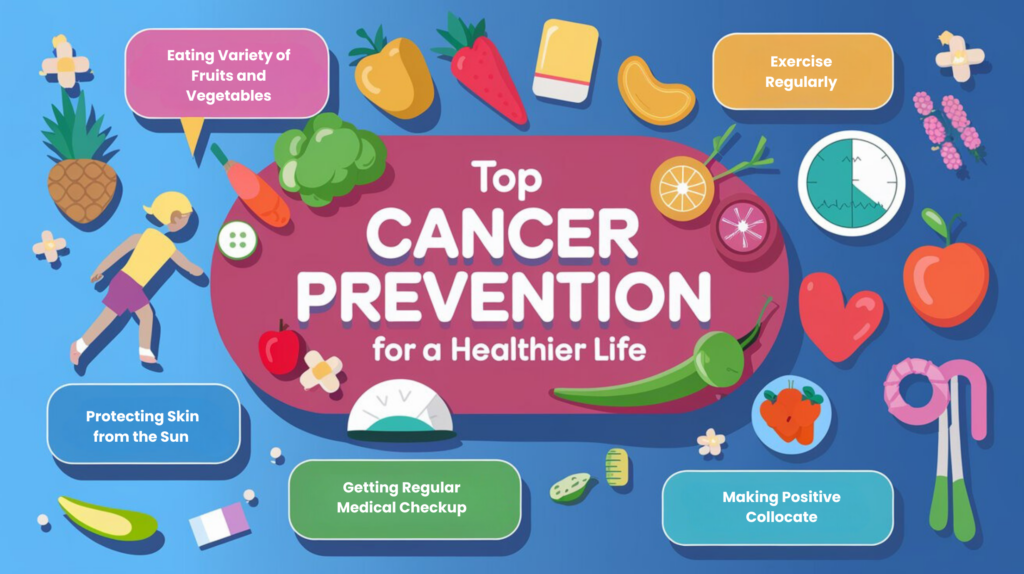
Cancer remains one of the most significant global health challenges, impacting millions of lives every year. While factors such as genetics and age are beyond our control, research consistently highlights that lifestyle choices and preventive measures can dramatically lower the risk of developing cancer. Embracing a healthier lifestyle not only adds years to your life but also enhances its quality. Below are evidence-based strategies to help you prevent cancer and maintain a vibrant, healthy life.
1. Adopt a Nutrient-Rich Diet
Your diet is a cornerstone of cancer prevention. Focus on consuming a variety of nutrient-rich foods, including fruits, vegetables, whole grains, lean proteins, and healthy fats. Plant-based foods are especially beneficial, as they are rich in antioxidants, vitamins, and fiber that help combat cellular damage. Aim for at least five servings of fruits and vegetables daily, with an emphasis on cruciferous vegetables like broccoli, kale, and Brussels sprouts, which are linked to reduced risks of cancers such as colorectal and lung cancer.
Avoid processed meats like sausages and hotdogs, which are associated with colorectal cancer, and limit red meat consumption. Opt for protein sources like fish, beans, and legumes. Spices such as turmeric, which contains curcumin, have anti-inflammatory and anti-cancer properties. Stay hydrated by choosing water as your primary beverage and avoiding sugary drinks and excessive caffeine. Small, gradual dietary changes can provide long-term protection against cancer.
2. Maintain a Healthy Weight
Obesity is a significant risk factor for several cancers, including breast, colon, pancreatic, and endometrial cancers. Excess body fat can create a chronic inflammatory state and lead to hormonal imbalances that promote cancer growth. Achieve and maintain a healthy weight through balanced nutrition and regular physical activity.
Use your body mass index (BMI) as a general guide but focus on overall body composition. Combine aerobic exercises like walking or swimming with resistance training for the best results. Even modest weight loss in overweight individuals can reduce cancer risk markers.
3. Stay Physically Active
Regular physical activity offers powerful protection against cancer. Exercise strengthens your immune system, reduces inflammation, and regulates hormones like insulin and estrogen that influence cancer risk. The World Health Organization (WHO) recommends at least 150 minutes of moderate exercise or 75 minutes of vigorous activity per week for adults.
Incorporate activities like brisk walking, cycling, yoga, or dancing into your routine. Everyday actions, such as taking the stairs, gardening, or walking short distances, also count. Consistent movement makes your body less hospitable to cancer cells, reinforcing the importance of an active lifestyle.
4. Avoid Tobacco Products
Tobacco use is the leading preventable cause of cancer worldwide. Smoking is linked to nearly all lung cancers and increases the risk of cancers affecting the mouth, throat, esophagus, pancreas, bladder, and more. Chewing tobacco is also associated with oral and pancreatic cancers.
If you smoke, quitting is one of the most impactful steps you can take. Utilize resources such as counseling, support groups, and nicotine replacement therapies. For non-smokers, avoid exposure to secondhand smoke to protect your health.
5. Limit Alcohol Consumption
Excessive alcohol intake raises the risk of cancers, including those of the liver, breast, colon, esophagus, and mouth. Alcohol metabolizes into acetaldehyde, a toxic compound that damages DNA and promotes cancer.
If you choose to drink, do so in moderation—up to one drink daily for women and two drinks for men. Non-alcoholic alternatives or mocktails are excellent options for those seeking healthier choices.
6. Protect Your Skin from UV Rays
Skin cancer, including melanoma, is one of the most common yet preventable cancers. Minimize sun exposure during peak hours (10 a.m.–4 p.m.) and use sunscreen with at least SPF 30 daily, even on cloudy days.
Wear protective clothing, wide-brimmed hats, and UV-blocking sunglasses. Avoid tanning beds, as they emit harmful UV rays. Regularly examine your skin for unusual moles or growths and consult a dermatologist for early intervention.
7. Get Vaccinated
Vaccines can prevent infections that increase cancer risk. The human papillomavirus (HPV) vaccine reduces the risk of cervical, anal, and throat cancers, while the hepatitis B vaccine protects against liver cancer.
Children and young adults benefit most from the HPV vaccine before exposure to the virus. Adults at risk for hepatitis B should also consider vaccination.
8. Avoid Exposure to Carcinogens
Minimize exposure to environmental carcinogens like asbestos, radon, and certain chemicals. Follow safety protocols at work and use protective gear when necessary. Opt for natural alternatives to pesticides and harsh household chemicals.
Reduce air pollution exposure by staying indoors during high-pollution periods and using air purifiers when needed. Proper ventilation in homes and workplaces further reduces exposure risks.
9. Limit Processed and Sugary Foods
Diets rich in processed and sugary foods contribute to obesity, inflammation, and insulin resistance—factors that increase cancer risk. Replace processed foods with whole, natural alternatives. Choose fresh fruits over sugary desserts and swap refined grains for whole grains like quinoa or brown rice.
10. Manage Stress Effectively
Chronic stress weakens the immune system, increases inflammation, and can lead to unhealthy habits like overeating or smoking. Incorporate stress management techniques such as mindfulness, meditation, yoga, or deep breathing into your routine.
Cultivate supportive relationships, engage in hobbies, and seek professional counseling if stress becomes overwhelming.
11. Undergo Regular Screenings
Early detection through regular screenings significantly improves cancer outcomes. Screenings for breast, cervical, colorectal, and prostate cancers are vital for certain age groups and risk profiles.
Discuss your family history and personal risk factors with your doctor to develop a tailored screening plan.
12. Prioritize Quality Sleep
Adequate sleep is essential for overall health and cancer prevention. Aim for 7–9 hours of uninterrupted sleep nightly. Develop healthy sleep habits, such as maintaining a consistent schedule, reducing screen time before bed, and creating a calming bedtime routine.
13. Stay Informed and Educate Others
Knowledge empowers prevention. Stay updated on cancer research and share insights with your family, friends, and community. Collective efforts in spreading awareness can help reduce the global cancer burden.
Integrate these practices into your life, and you’ll take proactive steps toward reducing cancer risk while fostering a healthier, more fulfilling lifestyle. Remember, even small, consistent changes can make a significant difference over time. Let’s work together to build healthier communities for future generations.
